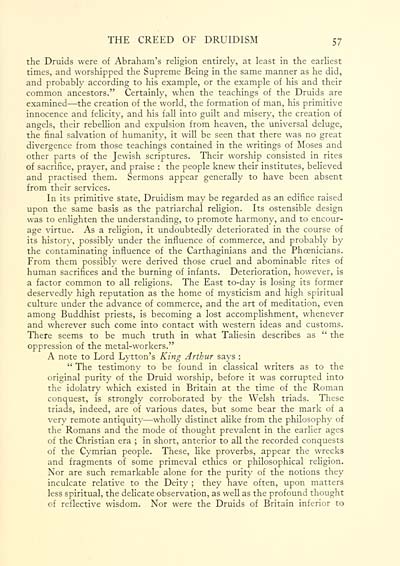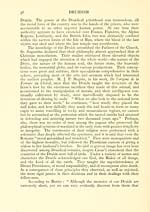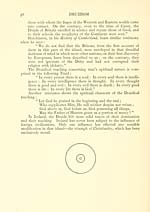Ossian Collection > Druidism
(79)
Download files
Complete book:
Individual page:
Thumbnail gallery: Grid view | List view

THE CREED OF DRUIDISM 57
the Druids were of Abraham's religion entirely, at least in the earliest
times, and worshipped the Supreme Being in the same manner as he did,
and probably according to his example, or the example of his and their
common ancestors." Certainly, when the teachings of the Druids are
examined — the creation of the world, the formation of man, his primitive
innocence and felicity, and his fall into guilt and misery, the creation of
angels, their rebellion and expulsion from heaven, the universal deluge,
the final salvation of humanity, it will be seen that there was no great
divergence from those teachings contained in the writings of Moses and
other parts of the Jewish scriptures. Their worship consisted in rites
of sacrifice, prayer, and praise : the people knew their institutes, believed
and practised them. Sermons appear generally to have been absent
from their services.
In its primitive state, Druidism may be regarded as an edifice raised
upon the same basis as the patriarchal religion. Its ostensible design
was to enlighten the understanding, to promote harmony, and to encour-
age virtue. As a religion, it undoubtedly deteriorated in the course of
its historv, possibly under the influence of commerce, and probably by
the contaminating influence of the Carthaginians and the Phoenicians.
From them possibly were derived those cruel and abominable rites of
human sacrifices and the burning of infants. Deterioration, however, is
a factor common to all religions. The East to-day is losing its former
deservedlv high reputation as the home of mysticism and high spiritual
culture under the advance of commerce, and the art of meditation, even
among Buddhist priests, is becoming a lost accomplishment, whenever
and wherever such come into contact with western ideas and customs.
There seems to be much truth in what Taliesin describes as " the
oppression of the metal-workers."
A note to Lord Lytton's King Arthur says :
" The testimonv to be found in classical writers as to the
original purity of the Druid worship, before it was corrupted into
the idolatry which existed in Britain at the time of the Roman
conquest, is strongly corroborated by the Welsh triads. These
triads, indeed, are of various dates, but some bear the mark of a
very remote antiquity — wholly distinct aUke from the philosophy of
the Romans and the mode of thought prevalent in the earlier ages
of the Christian era ; in short, anterior to all the recorded conquests
of the Cymrian people. These, like proverbs, appear the wrecks
and fragments of some primeval ethics or philosophical reUgion.
Nor are such remarkable alone for the purity of the notions they
inculcate relative to the Deity ; they have often, upon matters
less spiritual, the delicate observation, as well as the profound thought
of reflective wisdom. Nor were the Druids of Britain inferior to
the Druids were of Abraham's religion entirely, at least in the earliest
times, and worshipped the Supreme Being in the same manner as he did,
and probably according to his example, or the example of his and their
common ancestors." Certainly, when the teachings of the Druids are
examined — the creation of the world, the formation of man, his primitive
innocence and felicity, and his fall into guilt and misery, the creation of
angels, their rebellion and expulsion from heaven, the universal deluge,
the final salvation of humanity, it will be seen that there was no great
divergence from those teachings contained in the writings of Moses and
other parts of the Jewish scriptures. Their worship consisted in rites
of sacrifice, prayer, and praise : the people knew their institutes, believed
and practised them. Sermons appear generally to have been absent
from their services.
In its primitive state, Druidism may be regarded as an edifice raised
upon the same basis as the patriarchal religion. Its ostensible design
was to enlighten the understanding, to promote harmony, and to encour-
age virtue. As a religion, it undoubtedly deteriorated in the course of
its historv, possibly under the influence of commerce, and probably by
the contaminating influence of the Carthaginians and the Phoenicians.
From them possibly were derived those cruel and abominable rites of
human sacrifices and the burning of infants. Deterioration, however, is
a factor common to all religions. The East to-day is losing its former
deservedlv high reputation as the home of mysticism and high spiritual
culture under the advance of commerce, and the art of meditation, even
among Buddhist priests, is becoming a lost accomplishment, whenever
and wherever such come into contact with western ideas and customs.
There seems to be much truth in what Taliesin describes as " the
oppression of the metal-workers."
A note to Lord Lytton's King Arthur says :
" The testimonv to be found in classical writers as to the
original purity of the Druid worship, before it was corrupted into
the idolatry which existed in Britain at the time of the Roman
conquest, is strongly corroborated by the Welsh triads. These
triads, indeed, are of various dates, but some bear the mark of a
very remote antiquity — wholly distinct aUke from the philosophy of
the Romans and the mode of thought prevalent in the earlier ages
of the Christian era ; in short, anterior to all the recorded conquests
of the Cymrian people. These, like proverbs, appear the wrecks
and fragments of some primeval ethics or philosophical reUgion.
Nor are such remarkable alone for the purity of the notions they
inculcate relative to the Deity ; they have often, upon matters
less spiritual, the delicate observation, as well as the profound thought
of reflective wisdom. Nor were the Druids of Britain inferior to
Set display mode to: Large image | Transcription
Images and transcriptions on this page, including medium image downloads, may be used under the Creative Commons Attribution 4.0 International Licence unless otherwise stated. ![]()
| Early Gaelic Book Collections > Ossian Collection > Druidism > (79) |
|---|
| Permanent URL | https://digital.nls.uk/78950424 |
|---|
| Description | Selected books from the Ossian Collection of 327 volumes, originally assembled by J. Norman Methven of Perth. Different editions and translations of James MacPherson's epic poem 'Ossian', some with a map of the 'Kingdom of Connor'. Also secondary material relating to Ossianic poetry and the Ossian controversy. |
|---|
| Description | Selected items from five 'Special and Named Printed Collections'. Includes books in Gaelic and other Celtic languages, works about the Gaels, their languages, literature, culture and history. |
|---|

